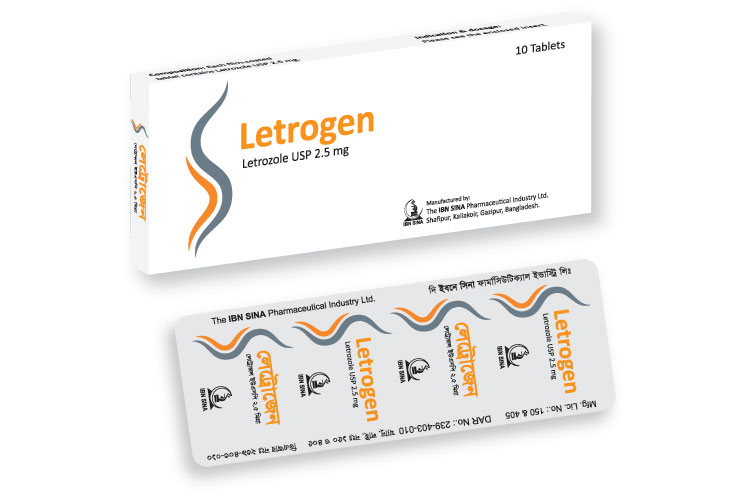
LETROGEN
LETROZOLE USP
| NAME | STRENGTH | PACK SIZE | DOSAGE FORM |
|---|---|---|---|
| LETROGEN 2.5 MG TABLET | 2.5 MG | 10 S | TABLET |
Each film-coated tablet contains Letrozole USP 2.5 mg.
Letrozole is a nonsteroidal competitive inhibitor of the aromatase enzyme system; it inhibits the conversion of androgens to estrogens. In adult nontumor-and tumor-bearing female animals, letrozole is as effective as ovariectomy in reducing uterine weight, elevating serum LH, and causing the regression of estrogen-dependent tumors. In contrast to ovariectomy, treatment with letrozole does not lead to an increase in serum FSH. Letrozole selectively inhibits gonadal steroidogenesis but has no significant effect on adrenal mineralocorticoid or glucocorticoid synthesis.
Letrozole inhibits the aromatase enzyme by competitively binding to the heme of the cytochrome P450 subunit of the enzyme, resulting in a reduction of estrogen biosynthesis in all tissues. Treatment of women with letrozole significantly lowers serum estrone, estradiol and estrone sulfate and has not been shown to significantly affect adrenal corticosteroid synthesis, aldosterone synthesis, or synthesis of thyroid hormones.
Letrozole is indicated for the adjuvant treatment of postmenopausal women with hormone receptor positive early breast cancer.
Recommended Dose: The recommended dose of Letrozole is one 2.5 mg tablet administered once a day, without regard to meals.
Use In Adjuvant Treatment Of Early Breast Cancer: In the adjuvant setting, the optimal duration of treatment with Letrozole is unknown. The planned duration of treatment in the study was 5 years with 73% of the patients having completed adjuvant therapy. Treatment should be discontinued at relapse.
Use in Extended Adjuvant Treatment of Early Breast Cancer: In the extended adjuvant setting, the optimal treatment duration with Letrozole is not known. The planned duration of treatment in the study was 5 years. In the final updated analysis, conducted at a median follow-up of 62 months, the median treatment duration was 60 months. Seventy-one percent of patients were treated for at least 3 years and 58% of patients completed least 4.5 years of extended adjuvant treatment. The treatment should be discontinued at tumor relapse.
Use in First and Second-Line Treatment of Advanced Breast Cancer: In patients with advanced disease, treatment with Letrozole should continue until tumor progression is evident.
Letrozole may cause fetal harm when administered to a pregnant woman and the clinical benefit to premenopausal women with breast cancer has not been demonstrated. Letrozole is contraindicated in women who are or may become pregnant. If Letrozole is used during pregnancy, or if the patient becomes pregnant while taking this drug, the patient should be apprised of the potential hazard to a fetus.
Bone Effects: Use of Letrozole may cause decreases in bone mineral density (BMD). Consideration should be given to monitoring BMD.
In the adjuvant trial the incidence of bone fractures at any time after randomization was 13.8% for Letrozole and 10.5% for tamoxifen. The incidence of osteoporosis was 5.1% for Letrozole and 2.7% for tamoxifen. In the extended adjuvant trial the incidence of bone fractures at any time after randomization was 13.3% for Letrozole and 7.8% for placebo. The incidence of new osteoporosis was 14.5% for Letrozole and 7.8% for placebo.
Cholesterol: Consideration should be given to monitoring serum cholesterol. In the adjuvant trial hypercholesterolemia was reported in 52.3% of Letrozole patients and 28.6% of tamoxifen patients. CTC grade 3-4 hypercholesterolemia was reported in 0.4% of letrozole patients and 0.1% of tamoxifen patients. Also in the adjuvant setting, an increase of = 1.5 X ULN in total cholesterol (generally non-fasting) was observed in patients on monotherapy who had baseline total serum cholesterol within the normal range (i.e., < =1.5 X ULN) in 151/1843 (8.2%) on Letrozole vs 57/1840 (3.2%).Lipid lowering medications were required for 25% of patients on Letrozole and 16% on tamoxifen.
The most serious adverse reactions from the use of Letrozole are: - Bone effects & Increases in cholesterol. Because clinical trials are conducted under widely varying conditions, adverse reactions rates observed in the clinical trials of a drug cannot be directly compared to rates in the clinical trials of another drug and may not reflect the rates observed in practice.
Pregnancy Category X. Letrozole may cause fetal harm when administered to a pregnant woman and the clinical benefit to premenopausal women with breast cancer has not been demonstrated. Letrozole is contraindicated in women who are or may become pregnant. If this drug is used during pregnancy, or if the patient becomes pregnant while taking this drug, the patient should be apprised of the potential hazard to a fetus.
Letrozole caused adverse pregnancy outcomes, including congenital malformations, in rats and rabbits at doses much smaller than the daily maximum recommended human dose (MRHD) on a mg/m² basis. Effects included increased post-implantation pregnancy loss and resorptions, fewer live fetuses, and fetal malformations affecting the renal and skeletal systems. Animal data and Letrozole’s mechanism of action raise concerns that Letrozole could be a human teratogen as well.
Physicians should discuss the need for adequate contraception with women who are recently menopausal. Contraception should be used until postmenopausal status is clinically well established.
Tamoxifen: Co administration of Letrozole and tamoxifen 20 mg daily resulted in a reduction of Letrozole plasma levels of 38% on average. Clinical experience in the second-line breast cancer trials indicates that the therapeutic effect of Letrozole therapy is not impaired if Letrozole is administered immediately after tamoxifen. Cimetidine: A pharmacokinetic interaction study with cimetidine showed no clinically significant effect on Letrozole pharmacokinetics. Warfarin: An interaction study with warfarin showed no clinically significant effect of Letrozole on warfarin pharmacokinetics. Other anticancer agents: There is no clinical experience to date on the use of Letrozole in combination with other anticancer agents.
No specific treatment for overdose is known; treatment should be symptomatic and supportive.
Store at 25°C (77°F); excursions permitted to 15 to 30°C.
Each box contains 1×10 tablets in Alu-Alu blister strip.
